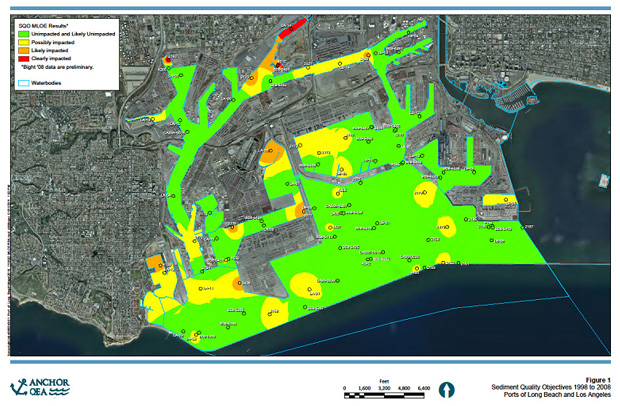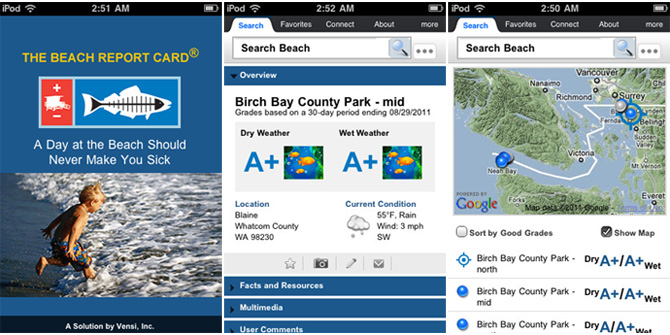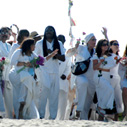Oct. 10, 2011–This month, Heal the Bay meets with leaders from critical state and federal agencies regarding a topic very important to protecting water quality: DIRT! More specifically sediment, the dirt that gets deposited little by little along the ocean floor.
What’s so important about sediment, and why is Heal the Bay involved?
Dredging projects require the digging of sediment from a waterbody. Sometimes it is done for navigation; sediment builds up in a waterway to the point where it can hinder the passage of boats and other water craft. Sometimes it is done to make room for a new development, such as a new dock for cruise ships. Other times, dredging is done just to clean up the ocean by removing contaminated sediment.
Last month the Los Angeles Regional Water Quality Control Board permitted the Port of Los Angeles for a dredging project along the San Pedro waterfront. That doesn’t sound like a big deal. Dredging projects in our ports are commonplace right? What’s notable about this one is that all of the sediment dredged will be reused in beneficial ways. The clean sand that is dredged will be used for beach nourishment at Cabrillo Beach. The not-so-clean stuff will be used for a Port of L.A. railyard project, where it will be compacted and buried under layers of clean material to prevent it from returning to the environment.

Heal the Bay supports projects such as this because managing contaminated sediment protects human health and the aquatic environment, an important goal for us. Heal the Bay’s Angler Outreach program warns pier fishers of the dangers of eating certain species of fish that are contaminated due to sediment pollution that has worked its way up the food chain.
In the past, the ports have been pretty good about reusing dredged sediment for slip fill and other projects that have conveniently occurred around the same time as dredging projects. For instance, the Port of Long Beach started construction of its Middle Harbor Project, which not only was able to take a few million cubic yards of material from within the Port of Long Beach, but also accepted around 3 million cubic yards of material from other projects throughout Southern California.
Unfortunately, there are no big projects that can accept large quantities of sediment planned in the near future, so project proponents are running out of options for where to put dredged material. Without a regional solution for storing and processing sediment, contaminated material will have to be trucked to upland landfills far away, which is expensive and impacts air quality. Clean material that meets chemistry and toxicity requirements could be sent to open ocean disposal sites, an option Heal the Bay does not support due to concerns over long-term impacts to aquatic life.
The Contaminated Sediment Task Force (CSTF) is a multi-agency committee that makes decisions about how to manage contaminated sediment in Los Angeles coastal waters. Heal the Bay represents the public on the CSTF and is one of few environmental groups that follows these projects consistently.
Additional members of the CSTF include:
- Army Corps of Engineers: Federal Regulatory Agency charged with maintaining navigation throughout the country. It’s often a dredging project proponent AND regulator (issues federal permit);
- Regional Water Quality Control Board: State regulatory body charged with protecting water quality in L.A., including the discharge of waste into water bodies;
- California Coastal Commission: State agency charged with upholding the California Coastal Act and protecting coastal resources and public access to these resources;
- US Environmental Protection Agency (Region 9): Protects the environment In California and neighboring states in the Pacific Southwest; regulates sediment that is proposed to go to the ocean for disposal;
- Port of Los Angeles and Port of Long Beach, and other dredging project proponents.
CSTF’s goal is to facilitate 100% beneficial reuse of contaminated sediment in the region. The CSTF plans to meet next week to explore options for creating a regional facility for the storage, processing, and even treatment of contaminated sediment. At this meeting, we will discuss the barriers to creating this facility, and hopefully, how to overcome them so we can have a safe way to deal with contaminated sediment to prevent its impact to the environment for years to come.
Find out more about sediment and stay tuned to get the latest dirt.
–Susie Santilena, Environmental Engineer in Water Quality, Heal the Bay







 “It was a beautiful event to be a part of, ” said Meredith McCarthy, Heal the Bay’s Director of Programs. “We often get trapped in our heads here. Honoring the Sea was all heart.”
“It was a beautiful event to be a part of, ” said Meredith McCarthy, Heal the Bay’s Director of Programs. “We often get trapped in our heads here. Honoring the Sea was all heart.”